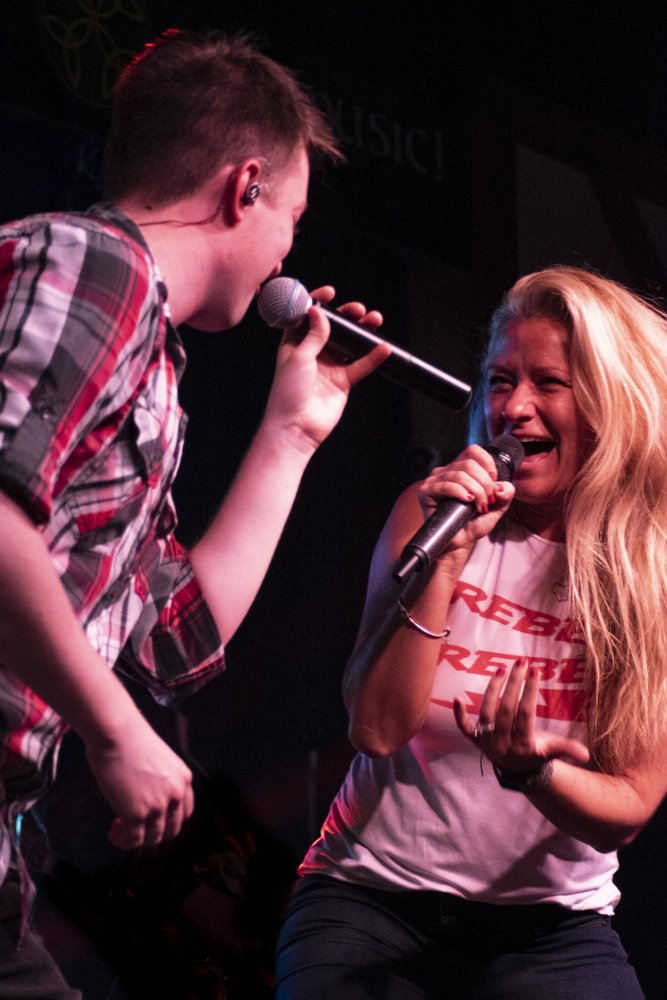A Silent Song: Stories of Working Class Wisconsin Musicians Throughout the Pandemic
Feb-May 2021. Story and photographs by Trevor J. Keay
As Andy Holley wrapped up his set, Paulie’s Pub and Eatery was packed. It’s near bar-close on February 27th, 2021. To the untrained eye, it would seem that the coronavirus pandemic had never existed. Yet, to Holley’s band, Milwaukee’s Ten Feet Tall, the last year had been all too real.
“It started, obviously, doom and gloom,” says Andy, who like many others, immediately found all his gigs cancelled when Wisconsin Governor Tony Evers’ stay-at-home order went into effect on March 25th of 2020. “We didn’t practice. Like everybody else, we hunkered down.”
Since long before the coronavirus pandemic, local musicians could make a comfortable living entertaining crowds at the countless clubs, bars and restaurants across Wisconsin. This relationship benefited both local businesses and musicians, and allowed for a community of freelance sound engineers and stage light operators to flourish. When the coronavirus pandemic made its way to the midwest, this entire industry found itself out of work, seemingly overnight.
Other musicians weren’t as lucky during the summer of 2020. Bands from the cities of Madison and Milwaukee had it the worst, as the higher population density led to greater risk of infection, resulting in more stringent lockdown conditions. Madison garage rock band Lunar Moth would play 2 or 3 shows on a given weekend before the pandemic ravaged their city. In the year that followed, they managed only 2 livestreams and one outdoor gig with strict safety percautions.
Yet, for most, the warmer weather bore good and bad news. Local act Mt. Olive managed to play a handful of outdoor shows during the summer of 2020, but at one event in August, the band received heavy backlash after their set on social media. “The day after the show, I woke up to over 200 DMs on Messenger from people I had never met, telling me how horrible I was, and how I was personally responsible for the spread of Covid,” notes Jessica Freiburger, one of the band’s vocalists. For Mt. Olive and many others, 2020 became a balancing act between staying alive as a full-time musician, and the risk posed by coronavirus.
The risk was too great for some to take. While cover band Dirty Boogie did their best to keep money coming in the door as they transitioned back indoors in the fall, their bassist, who worked as a high school math teacher during the week, had to call it quits. The rest of the band continued without him, using fill-ins as necessary. “This is all I do. This is how I eat,” explains Dirty Boogie’s frontman, Ben Janzow. “For me, it was a calculated risk to continue to play.”
It became clear that if the music scene was to stay alive, it would have to get creative.
For many, this took the form of livestreams. At the Saloon on Calhoun in Brookfield, such events proved to be a great source of revenue early in the pandemic. For the Saloon’s production technician, Dan Henszey, they became the only way to work in a suddenly sparse industry. “This venue is an exception to the rule,” he says. “We opened up the week that the week that the state declared the lockdown rules were invalid (May 13, 2020.) That week we did our first stream, and 2 weeks later, we did another one. Since the first week of June in 2020, we’ve been open every weekend, and we were the only club in the state that was able to do that.”
Those who preferred a more physical experience found different ways to play shows. In the case of Joe Ketchum and Randy Hogan’s project, Xeno and Joe, playing a live show meant playing through glass. Only a few weeks after the lockdown order was issued in the state of Wisconsin, the duo performed in front of the large front windows of The Bay, a restaurant in Whitefish Bay WI, with a speaker set up outside. Hogan recalls “the police kept driving by, and if too many people congregated, they broke it up. We could only have 9 or 10 people there at one time.” The group went on to perform several live streams as well, transitioning slowly into in-person performances starting in late May of 2020.
Others thought outside of the box in different ways. Gabriel Sanchez, frontman of the touring act The Prince Experience, accidentally made a completely new band. Suddenly short on work and full of free time, Sanchez and a few friends from other local acts, including Rich Hoffman, the vocalist of cover band Almighty Vinyl, and Jeremy Jayson, the guitar tech of Disturbed, formed Without Anette, a Southern Wisconsin supergroup of sorts. After forming in late 2020, the cover act quickly became a favorite for livestreams, private events, and later in-person shows, in part undoubtedly due to its lineup of local celebrities. Despite their popularity, Gabriel Sanchez knew that the band’s days were numbered from the start. In March of 2021, he noted, “It’s not going to last. It will be more and more sporadic as things open up, because we’re all going to be busier.”
While resilience to the virus took many forms, all can agree that it would take a lot more than a pandemic to kill local music in Wisconsin. Through many forms of innovation, venue owners have kept bands playing, thus keeping Wisconsin’s musicians working. While the landscape of local artists may never be exactly the same as it was, one can be sure that the music will play on.












